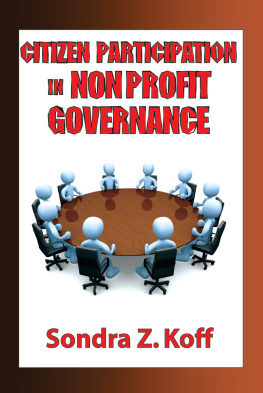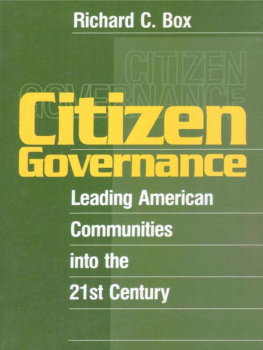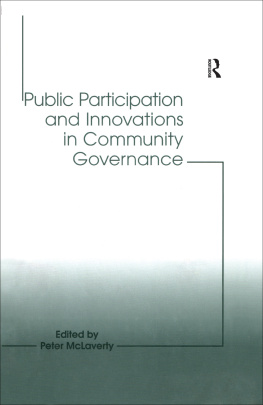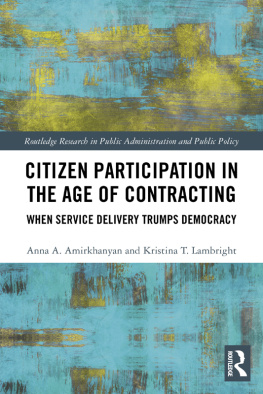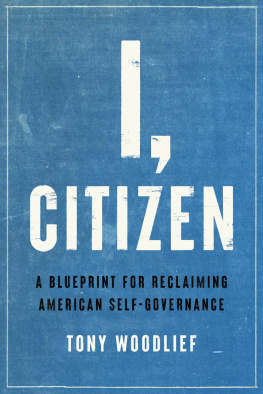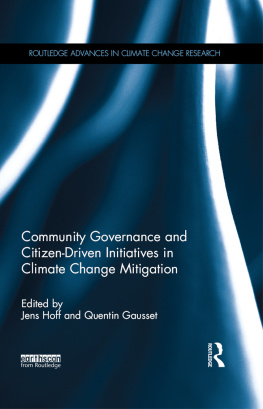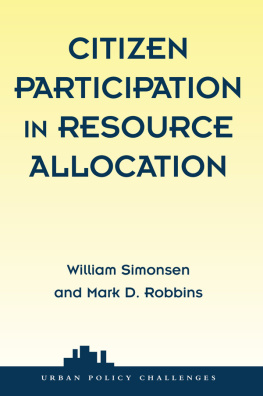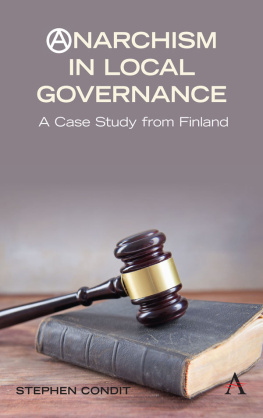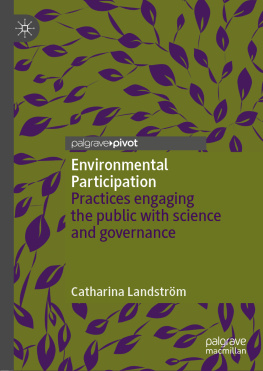CITIZEN PARTICIPATION IN NONPROFIT GOVERNANCE
CITIZEN PARTICIPATION IN NONPROFIT GOVERNANCE
Sondra Z. Koff
First published 2009 by Transaction Publishers
Published 2017 by Routledge
2 Park Square, Milton Park, Abingdon, Oxon OX14 4RN
711 Third Avenue, New York, NY 10017, USA
Routledge is an imprint of the Taylor & Francis Group, an informa business
Copyright 2009 by Taylor & Francis.
All rights reserved. No part of this book may be reprinted or reproduced or utilised in any form or by any electronic, mechanical, or other means, now known or hereafter invented, including photocopying and recording, or in any information storage or retrieval system, without permission in writing from the publishers.
Notice:
Product or corporate names may be trademarks or registered trademarks, and are used only for identification and explanation without intent to infringe.
Library of Congress Catalog Number: 2009007533
Library of Congress Cataloging-in-Publication Data
Koff, Sondra Z.
Citizen participation in non-profit governance / Sondra Z. Koff.
p. cm.
Includes bibliographical references and index.
ISBN 978-1-4128-1042-5 (alk. paper)
1. Nonprofit organizations--Management--Citizen participation. 2. Boards of directors-Citizen participation. 3. Corporate governance--Citizen participation. I. Title.
HD62.6.K639 2009
658.422--dc22
2009007533
ISBN 13: 978-1-4128-1042-5 (hbk)
For
Steve
A Committed Public Member who is sorely missed
and
Abigail, Atticus, Eleanora, Madelyn, and Zenyram
May they grow into
Committed Public Members
WITH LOVE
Contents
The idea for this research was born at a National Organization for Competency Assurance (NOCA) conference that I attended as a public member of the Healthcare Quality Certification Board. One session, at which I was present, consisted of a conversation with the late Ben Shimberg, a well-known authority on professional licensing and certification issues and a fierce advocate of public representation on regulatory boards. Many topics were discussed during that session, but I was particularly intrigued by the attendees comments concerning public members on governing bodies. For the most part, the opinions expressed were negative in nature. On this subject I viewed the session primarily as an example of public-member bashing. Being unable to attract the attention of the moderator, so I could have a say before time ran out, I vowed to further pursue this matter. This research endeavor was spurred by these remarks. I wondered how public members would react to these comments. How would other executive directors respond? Who are the public members? What are the precise problems related to their participation? How are these problems viewed by agency leaders? Do public members hold the same perspective? How might these problems be solved?
This work was long in the making. Unfortunately, progress was significantly delayed due to serious illness in the family and the resulting loss of my sounding board and always my first reader, Stephen P. Koff, a fellow political scientist and public member, who, even though he worked in another field, had a knack for posing challenging questions and advancing unique perspectives on issues. Even during his last days he wanted to discuss this research. Given his commitment to the public member role and his significant interest in the project, I had every reason to complete it.
I am most appreciative of the support and encouragement I received from several quarters. First and foremost, I thank those chief executive officers and public members who completed the survey instruments. Voluntary comments appended to them were most welcome and useful as were letters of encouragement from both constituencies. And even the few negative comments concerning the project were instructive. Bonnie Aubin was serving as the executive director of NOCA during the initial stages of this work. Her understanding of the research, support, and efforts on my behalf were singular and crucial to the completion of the project. Janice Moore, Associate Director of NOCA, enthusiastically provided valuable assistance for which I am grateful. The encouragement and support of my colleagues on the Healthcare Quality Certification Board and its executive director during my term of office, Jan Marone, must be recognized. Their understanding of the undertaking was immediate. Furthermore, my participation on other sub-national and national governing bodies as a public member has served to enhance my belief in the importance of this role. I am thankful to my colleagues on these boards and their chief executive officers for providing me with worthwhile, challenging, learning, and entertaining experiences along with much hard work. Acknowledgment is also gratefully made to an anonymous reviewer whose constructive criticism and helpful comments were much appreciated.
Hopefully, I have penned a volume of use to public members, agency personnel, and a wider audience as well. Although I have received aid from various sources, I assume full responsibility for its content.
Sondra Z. Koff
The performance, vitality, well-being, and effectiveness of a society, its government, and social institutions are related to communitarian involvement, associational development, and voluntarism, among other things. It is these ingredients that, in part, explain a social fabric permeated with trust and cooperation, or social capital, those features of social lifenetworks, norms and trustthat enable participants to act together more effectively to pursue shared objectives (Putnam, 1995, p. 664). In a broader interpretation social capital also consists of access as well as resources available to individuals and groups. Being the glue that cements linkages within various constituencies and across and beyond them, enhancing cooperation, and thus, allowing broader interests to be served, social capital is of great import. It is based on the premise that greater contact between people creates more trust and resulting social ties make individuals and groups more productive. The social and economic resources embodied in social networks are enhanced. In essence, these networks create value, the benefits of which serve a variety of purposes and reach beyond persons immediately involved. Moreover, the correlation between social trust and civic engagement is strong (Foley & Edwards, 1999; Putnam, 2000; Putnam & Feldstein, 2003).
Ever since colonial times Americans of all types have exhibited their propensity to form a wide variety of voluntary associations and their active voluntarism. Tocquevilles well-known picture of the United States had a prominent place for associational development and the citizens capacity for participation. He observed: In no country in the world has the principle of association been more successfully used or more unsparingly applied to a multitude of different objects, than in America (Tocqueville, 1946, p. 126). He singled out the United States as the only country in the world where the right of association had been used productively to secure all the advantages that civilization could bestow. For him the science of association is the mother of science; the progress of all the rest depends upon the progress it has made (Tocqueville, p. 381). Voluntary associations are ascribed a significant role in the development of social capital. Moreover, civil societies, consisting of a multitude of these groups that serve as counterparts to formal governmental institutions, are seen as necessary for robust and effective democratic performance (Wollebaek & Selle, 2002).


